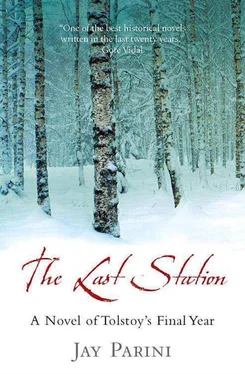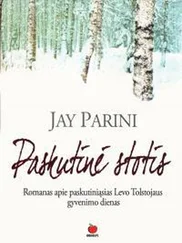When I finished typing, I went to his study for a signature. Getting no response to a knock, I walked in to find him sleeping with his head on the desk. It was noon exactly. I put a hand on his shoulder and set down the letter so that when he woke he would find it.
Without warning, he lifted his head. ‘I’m afraid my powers of work exist in inverse proportion to my desire to work,’ he said. ‘In the past, I often lacked the desire to work. But now, near the end of my life, I find I have to restrain it.’
That afternoon, he seemed much livelier. Goldenweiser, the pianist, arrived with his frowsy wife, cheering the company with his broad jokes and genial manner. Dushan Makovitsky withdrew from the house immediately. His anti-Semitism is quite spectacular in its vehemence, though totally irrational; Leo Nikolayevich has told him so.
Sofya Andreyevna begged Goldenweiser to play, though this was a mere formality. He would have been crushed had she not. The man adores attention, and he does play well – better than Sofya Andreyevna, to be sure.
I hoped that it might be possible to slip away before the little concert began, but Leo Nikolayevich ushered me into the drawing room with a hand on my shoulder. ‘Come and listen,’ he said. ‘You like music, don’t you?’
Indeed. Back in Moscow, I had been tremendously interested in opera. I took lessons in singing throughout my boyhood and youth, and at one point went so far as to consider a musical career. The only thing I lacked, it seemed, was talent.
Goldenweiser swayed over the keyboard in a kind of trance, his chin to the ceiling. I was stirred by the performance and watched Leo Nikolayevich as the notes played over his ragged face and his brow loosened; his cheeks were sucked and blown; the white, bushy eyebrows twitched. His eyes blackened, like holes pricked in the visible surface of the world, deepening into eternity. Tears stained his cheeks.
When Goldenweiser had completed Chopin’s Étude in E major, opus 10, Leo Nikolayevich sighed. ‘When a lovely piece of music pleases you, you imagine that you wrote it yourself,’ he said.
‘Chopin considered that étude among his finest compositions,’ said Goldenweiser. ‘I am so glad you like it, Leo Nikolayevich.’
‘If a man came down from Mars and said this étude was worthless, I would dispute him. But there is one thing that worries me. This music would be incomprehensible to the common people.’ He went on to say that he loved music above all the arts, however, even if it has no social value or intellectual content.
As I rode home through the sharp afternoon light, the stubble fields were yellow and damp, the willows flush with new leaves. I found myself thinking about Leo Nikolayevich. I love him, and I can hardly bear it that he is eighty-two and must soon die. But he would hate knowing that such a thing upsets me. And, of course, I have no reason to be so upset. I am not his son, not even a nephew or, for that matter, a friend of long standing. yet I feel that God has connected us in some mysterious way, has brought us together for reasons unknown, perhaps, to either of us.
Masha was not at Telyatinki when I arrived, and I felt uneasy about her absence. The prospect of spending the afternoon with Sergeyenko and his merry band did not excite me. I went straight to my room, hoping to get some work done. But I found it difficult to concentrate, thinking first of Masha, then of Leo Nikolayevich in his exhaustion. Life seemed terribly fragile to me, like a shimmering mirage.
I turned my mind once again to the Inner Chapters of Chuang Tsu, which Leo Nikolayevich had given me to search. I lit upon this passage:
The great ones of ancient times slept a dreamless sleep. They woke without fear. They ate simple food, and they breathed deeply. The breath of the great ones rose from their heels, in contrast to the mediocre people of today, whose breath rises from their throats like vomit. When they are filled with lust and desire, their heavenly nature grows shallow.
The great ones of ancient times knew nothing of loving life or death. They felt no elation at birth. They felt no sorrow when they entered death. Carefree they went and came. That was all. They delighted in what was given, but they gave it no further thought.
I am not among the great ones, but I understand what must be done – or not done – to become more like them. I have to give up desire and loathing. I have to delight in what happens, whatever is given. I should not struggle or exert my own petty will.
I knelt beside the bed and prayed to become nothing, to accept life and death, loving neither overmuch, giving myself to the currents of eternal being that moved through me. When I stood, I felt cleansed and whole. A new spirit burned in my heart, as if God had touched me invisibly. The room was bathed in dusky light, with a red – almost peach – glow on the bare walls; I sat on my cane chair and watched it, the simple color of sunset as it flickered against the whitewashed plaster.
The image of Masha’s face floated into my head; since it was nearly time for dinner, I decided to look for her.
The door to her room was ajar, and I knocked lightly. She didn’t answer, so I pushed it open.
‘Masha!’ I whispered.
She was not there. I should have turned back, but I noticed a diary on her bed table. It was no more than a few feet away. My heart thudding against my neck muscles, I shut the door. The red ball sun was caught in the window and flared on the little notebook’s roughcut pages. The diary opened to my name.
Valentin Fedorovich. His soft beard, the smell of his shirt at night: woodsmoke, oil. He is a simple creature, I think, with a decent heart. He does not know himself. He is probably not a true Tolstoyan, though be imagines that he is. As I do. One lives in hope.
I could scarcely hold the notebook now, turning the pages with trembling fingers. Sweat fell along my sleeves from under my arms, chilling me, as a particular line flashed from the page: ‘I may indeed love him. He does not love me.’
I do, Masha! I do! This declaration rang in my ears, in the bone of my brow. How can I make her understand that I love her?
I put the diary back where I had found it. One is driven to the edge of immorality by passion, which is why Chuang Tsu recommended against it.
So much for detachment. ‘Valya!’ It was Masha. I had just put her diary in place, yet I blushed as if she had caught me with the notebook open on my knees.
‘I was waiting for you. Your room was… open.’
Fortunately, she seemed unconcerned about my presence. She reached up and touched my beard as she passed me, flinging a package on the bed.
‘I’ll make you a new shirt, Valya,’ she said. ‘I bought some lovely blue muslin in town.’ She unwrapped the material, and I sat beside her on the bed. We fingered the rough cloth as though it was silk.
She was in supremely high spirits, talking of things she had seen in town, her reading, her afternoon conversation with Sergeyenko about Henry George, the American socialist, and the single-tax scheme he has proposed – a favorite subject of Sergeyenko ever since he discovered that Leo Nikolayevich admires George and corresponds with him.
‘I’ve never read Henry George,’ I said.
‘Then you’re really a virgin,’ she said.
Once again, I blushed. Masha always manages to tease me about my virginity. I have never made an issue of it. I have committed the act of copulation in my heart many times. My hope, now, rests on purity of heart, of mind, of conscience.
That night, during dinner and throughout our usual discussion in the parlor afterward, I could hardly focus.
‘Are you well, Valentin Fedorovich?’ Sergeyenko asked, putting a hand on my forearm as I was about to go to bed.
Читать дальше












